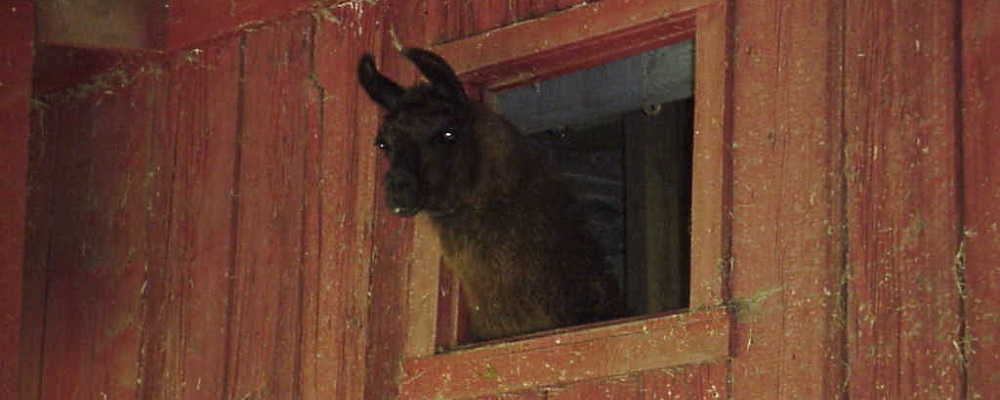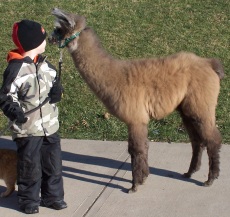First
things first: can you provide the basics?
Llamas
are enjoying a new popularity throughout the world, both as
work and companion animals. At Leisure Acres Llamas we understand
how anyone could fall in love with a llama, but we also understand
that llama ownership isn't for everyone. Before you make a decision
on whether llama ownership is right for you, consider the following
factors.
 1.
Llamas need land zoned for livestock 1.
Llamas need land zoned for livestock
It's absolutely essential that the land on which you plan to
keep your llamas is zoned for livestock. Check your local ordinances;
sometimes zoning for horses also includes llamas.
2.
Llamas like company ... and need space
Lamas don't like to live alone. They're social animals that like
to be part of a herd, and they're happiest in groups or at least
in pairs. So don't think about owning just one llama - think in
terms of owning two or more. You can generally count on needing
at least one acre of land for two to four llamas.
3.
Llamas need shelter and weather protection
You'll also need to provide a shelter for your llamas. They're
very adaptable and can thrive in many climates, but if your location
is subject to extremes of heat or cold you will need a substantial
shelter that stands up to the weather and provides adequate protection.
In extreme hot weather fans may be necessary to circulate air
in the shelter.
4.
Llamas need the right diet
When it comes to food, llamas have some specific needs. They have
segmented stomachs and they chew cud (partly digested food) much
like cows and sheep, so they require good pasturage and high quality
hay. Good nutrition
is absolutely essential for llamas and they have some specific
dietary needs, so be sure to discuss this issue with a knowledgeable
breeder. Llama food supplements are available to ensure sufficient
amounts of vitamins, minerals, and other crucial nutrients.
What
do you expect from a llama?
One of the keys to happy and successful llama ownership is understanding
what llamas are like and having realistic expectations. Llamas
are Camelids - members of the camel family - and though they can
definitely get along with other animals they really aren't anything
like horses, dogs, goats, or any other common domestic animals.
They're truly unique. Llamas are gentle, curious, calm, and intelligent.
They're often playful and may be mischevious. They're patient,
loyal, clean, undemanding, energetic, and easily trained ... but
they aren't "house pets" in any sense of the word. If you're looking
for a pet to cuddle or bring you your slippers, llamas aren't
the right choice. But for the right person in the right circumstances,
llamas are wonderful companion animals that can add a wonderful
new dimension to life.
Can
you give your llamas the time and attention they require?
Llamas are famously low-maintenance animals, but they do require
a certain amount of attention. It's a good idea to have your llamas
reside within easy view of your residence so you can keep an eye
on them; personal attention is crucial, particularly if you have
pregnant females. You need to get to know your llamas so you can
easily tell if any are exhibiting strange or distressed behaviors.
Llamas are uncomplaining animals and tend to hide sickness and
discomfort, so it's up to the owner to know his or her animals
and to investigate whenever one seems to be feeling or acting
"off".
Still have
questions? Give us a call or email
us .
We're always happy to help prospective owners make this important
decision.
|




